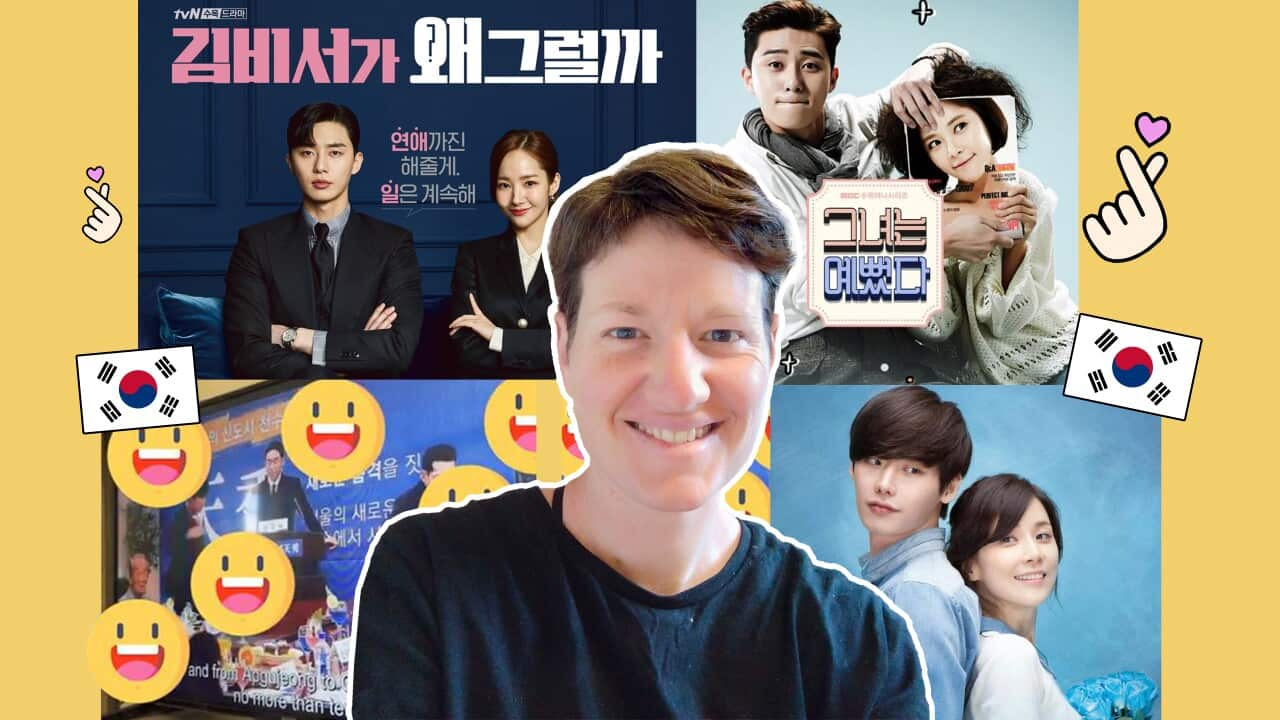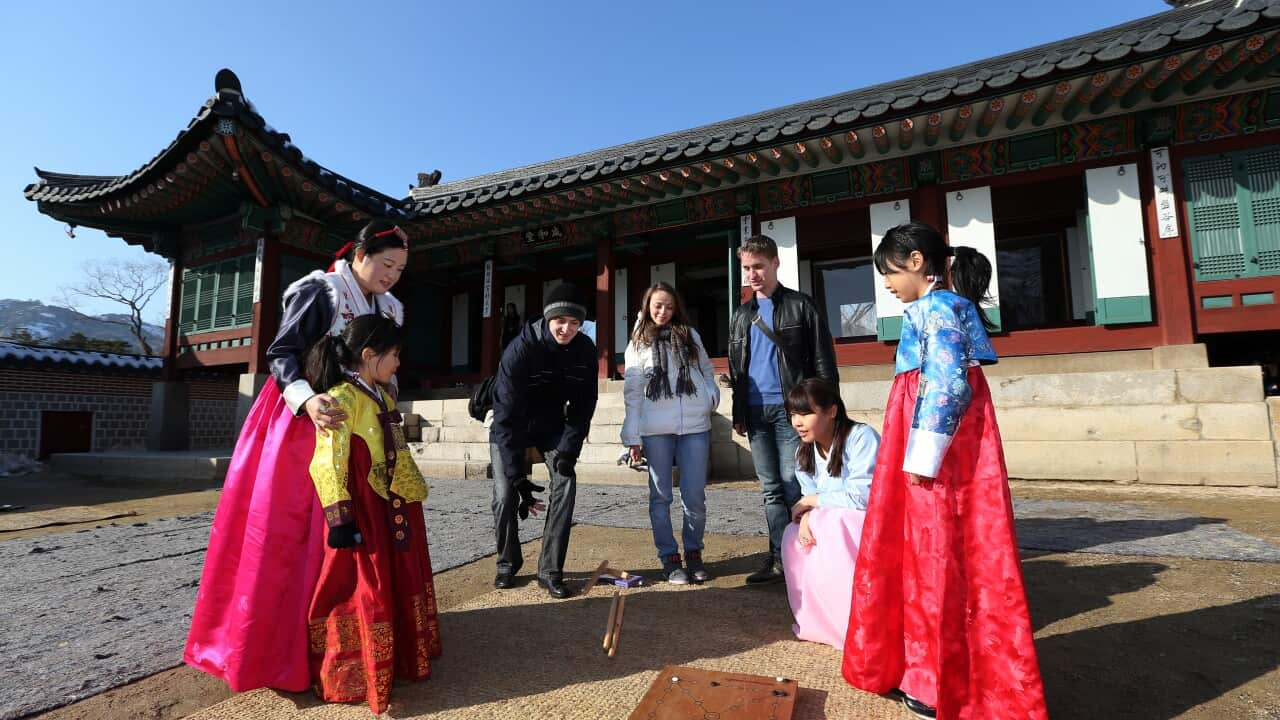

7 min read
This article is more than 2 years old
Why Australians are getting hooked on Korean TV
Looking for a new series to watch? Meet the Australians who've fallen in love with K-drama.
Published 22 January 2023 3:39pm
By Charis Chang
Source: SBS News
Image: Australians are embracing Korean dramas.
When Kate Daley watches TV, she says it feels like she's "sitting down with a friend". It brings a special sense of comfort.
That's because the 33-year-old, who lives in regional NSW, almost exclusively watches Korean drama series — known as 'K-drama' — despite not being Korean or speaking the Korean language. And she's not the only one.
While the hyper-violent international hit series Squid Game was many Australians' first introduction to TV being made in South Korea, most K-drama is very different.

Kate Daley recommends Australians give K-drama a go. Source: Supplied / Kate Daley
"I've just gotten really tired of the way western film wants to shock you all the time," she says.
"I just want to sit down and enjoy something — and actually enjoy it, not be scared or traumatised."
"I've been drawn to K-drama because it is safe, visually, for me to look at."
I've been drawn to K-drama because it is safe, visually, for me to look at.- Kate Daley, K-drama fan
It's an observation shared by others in Australia.
Sydney resident Liam Luangrathrajasombat runs a YouTube channel dedicated to Korean culture, including K-drama.
He says there is a "sense of sincerity" to the shows that is especially appealing when it comes to depicting relationships.

Liam Luangrathrajasombat posts reaction videos about K-pop and K-drama on YouTube. Source: Supplied / Charis Chang
"With K-dramas, there's this build-up of emotion and getting to know each other. They probably hate each other at the beginning [but] they grow to love each other at the end ... it's more about really building that relationship."
There are usually only a handful of kissing scenes too, and if the characters do sleep together, the sex is generally not shown.
Mr Luangrathrajasombat, who is of Laotian heritage, says he first became aware of K-drama after being exposed to Korean music. Many K-pop stars also appear in the TV shows.
The first drama he really loved was I Can Hear Your Voice.
Something K-drama does well is combining a romantic storyline with a mystery or crime plot, he says, and this one does that.
"Then there was another one, which I kind of fell into really hard, called She Was Pretty," he says.
"My mum has seen it and my brother has seen it ... and my mates as well. I haven't seen someone that hates it."
K-drama has in recent years been reaching a wider audience thanks to streaming services including Netflix. What's Wrong with Secretary Kim is one of the platform's most popular and gets a rating of 8.1 on IMDb.
Start-Up and It’s Okay to Not Be Okay were also among Netflix’s most popular K-drama series in 2020.
Last year, Netflix invested nearly $500 million USD ($718 million AUD) into producing more Korean content, partnering with major studios including Studio Dragon and JTBC.
Another satisfying feature of K-drama is that the shows are short; many only run for 16 to 24 episodes and second seasons are a rarity.
Korean culture and society is one of Associate Professor Roald Maliangkaij's research areas at Australian National University. He has also lived in South Korea and takes regular trips there.
He's noticed the increasing popularity of K-dramas among his students and believes it's growing through word of mouth. He puts the secret to their success down to great writing, with lots of plot twists and turns.
"One of the things that really stands out is the quality of the writing ... Korean writers are, I think, excellent," he says.
"This is something that Korean consumers are also demanding and have demanded for quite a while."

Liam Luangrathrajasombat (who posts videos on YouTube under the name Liam Luang) is just one Australian who loves K-drama. Source: YouTube
Shows also avoid typecasting women and "Korean women can often be very powerful characters in Korean dramas". But of course, they often star attractive people.
"It's quite easy to have a very soft spot for one of the actors in any Korean drama ... there's always a couple of very good-looking people ... or people who are really quite interesting because they are very intelligent," Associate Professor Maliangkaij said.
He believes South Korea's image as a futuristic society also adds to the shows' appeal.
"It is known to be one of the most modern places in the world, it's the source of a lot of modern technologies, and so that combined with all these traditional elements makes it quite appealing," Associate Professor Maliangkaij said.
"When you go to South Korea, you'll find that in a restaurant, you often don't have a waiter, you have a machine, so you order through the machine.
"The bus stop will tell you exactly when the bus arrives - not roughly, exactly - it's just one step ahead of us."

Source: Twitter
"Just being exotic itself doesn't work - it has to be exotic but at the same time, kind of modern, almost sci-fi."
Like any drama, the life depicted in the shows can be a bit unrealistic at times.
"Korea is a cutthroat society in that there's an enormous pressure on people to be successful and work hard," Associate Professor Maliangkaij said.
"So whenever you see a drama where people have a lot of time to talk to other people, I probably would say that's a bit unrealistic ... It's just a very tough place to live with long working hours.
"People don't really have a family life much during the week," he adds. "So if you see a Korean romantic drama where a husband or wife comes home late and has time for the children, or time for a chat with the partner, I'd say that's probably not as realistic.
"Whenever I watch dramas and people have a lot of time to sit at a bar during the day or sip coffee when there seems to be no pressure, I think 'gosh, that's certainly not the Korea I know'".
As well as Netflix, Apple TV+ has also recently developed Korean language shows including the sci-fi thriller Dr. Brain, and an adaptation of Min Jin Lee’s bestselling novel Pachinko, about four generations of a Korean immigrant family.
US-based streaming service Rakuten Viki has also produced Dramaworld, an original Korean drama set in Los Angeles and Seoul featuring Australian actress Liv Hewson. She plays a drama fan who somehow gets transported into the world of dramas. It is also available to watch in Australia on SBS On Demand.
Of course, people who don't speak Korean will need to watch with the subtitles on. But K-drama is also inspiring some to learn the language.
Mr Luangrathrajasombat started studying Korean after switching to international studies at university, which meant he could study overseas for a year.
"South Korea was the obvious choice, just because I had been really getting into that content," he says.
Lunar New Year is celebrated on Sunday 22 January.For more information and stories go to
Would you like to share your story with SBS News? Email



